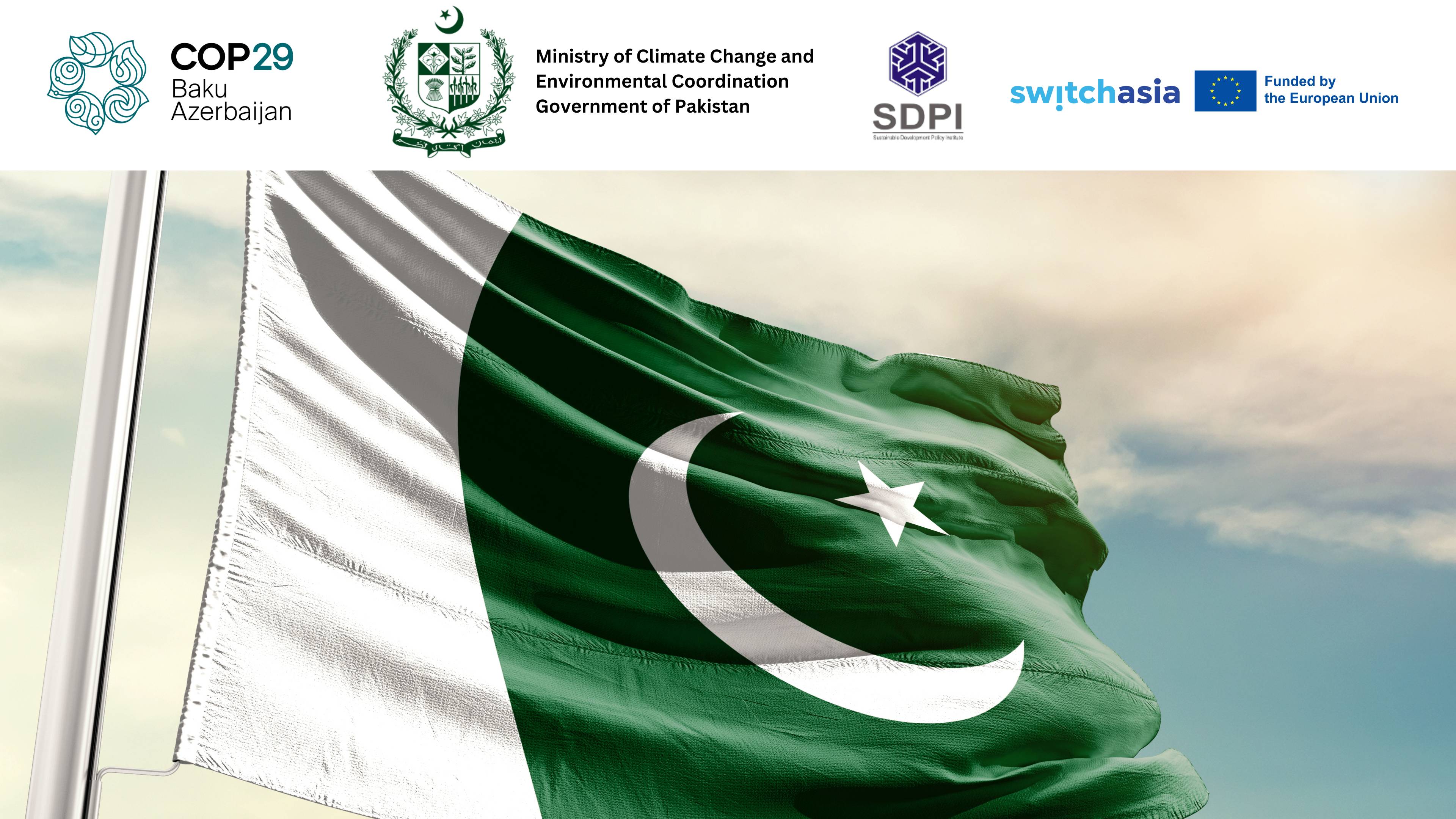
Baku, Azerbaijan – On November 18, 2024, the Ministry of Climate change and Environment Coordination of Pakistan together with the EU SWITCH-Asia Policy Support Component and Sustainable Development Policy Institute (SDPI), organised the Side Event “Circular Economy and Sustainable Consumption and Production in NDC 3.0 of Pakistan” at the Pakistan Pavilion of UNFCCC COP29.
One of the key agenda in the ongoing COP 29 is the Global Stocktake (GST) of the Paris Agreement aiming towards higher ambition and countries to frame their nationally determined contributions by March 2025. This stocktaking process is aimed at informing the next round of NDCs in order to increase their level of ambition; it also offers the opportunity to evaluate the need for enhanced action and support.
Unsustainable consumption and production patterns lie at the core of the triple planetary crises encompassing climate change, biodiversity loss, and pollution. The scientific community has firmly established the link between climate change and material consumption. According to the Global Resource Outlook 2024 report of the International Resource Panel (IRP), resource use has tripled in the last five decades and is expected to continue to increase; resource extraction has increased by nearly 400% since 1970 and is still growing by 2.3% per year; resource extraction and processing are responsible for over 60% of planet-warming emissions and 90% of land-related biodiversity loss; high-income countries use six times more materials per capita than low-income countries; bold policy action is needed to phase out unsustainable activities and it's possible to decouple economic growth from environmental impacts and resource use. The Report concludes that resources efficiency through sustainable consumption and production and circular economy are essential to the implementation of the agenda 2030 and multilateral environmental agreements. Pakistan, as a party to the UNFCCC and its Paris Agreement, is exploring options for integrating Sustainable Consumption and Production (SCP) and Circular Economy (CE) into its climate ambition, specifically the NDC 3.0 and LT-LEDS.
Ranga Pallawala, Climate Change Expert at the EU SWITCH-Asia Policy Support Component, opened the event with a scene setting intervention highlighting that the Global Stocktake (GST) process under the Paris Agreement has highlighted the urgent need for countries to leverage every available option to meet the agreement's objectives. Sustainable Consumption and Production (SCP) and Circular Economy (CE) approaches offer promising pathways to achieve additional emission reductions and strengthen adaptation measures beyond the conventional methods.
Dr. Rene Van Berkel mentioned that the importance of enhancing material resource efficiency presents a significant opportunity that countries cannot afford to miss in their efforts to address climate change challenges. This readily achievable option offers a strategic entry point to engage the private sector in climate action while fostering innovative systemic solutions for climate action, he added.
The panel discussion which was moderated by Ms. Zainab Naeem, Head of Circular Economy and Ecological Sustainability of SDPI brought views and opinions of a divers panel representing the government, private sector and international development partners. The Head of Corporate Affairs, Samsons Group of Companies of Pakistan Mr. Mian Rashid Rahim mentioned that material resource efficiency and circularity present compelling business opportunities for the private sector. While proven technologies like waste-to-energy systems have already demonstrated success in reducing methane emissions, there remains substantial scope for private sector innovation to advance climate action through enhanced resource efficiency approaches. Mr Marek Harsdorff– Technical Officer, Just Transition of the International Labour Organization (ILO), highlighted that while investments are crucial, successful implementation of circular economy and resource efficiency approaches also demands robust education and skill development programmes. Integrating circularity skills into capacity building initiatives is essential, as it promotes a more inclusive and comprehensive transition towards low-emission, climate-resilient development.
Dr. Abid Suleri, Executive Director of Sustainable Development Policy Institute (SDPI) and member of the International Advisory Panel for COP29 Presidency, took the floor during the panel discussion. He underscored that Sustainable Consumption and Production and Circular Economy are undoubtedly crucial for Pakistan, both in achieving its national climate targets and contributing to global climate action. The development of NDC 3.0 and Long-term Low Emission Development Strategy (LT-LEDS) presents a strategic opportunity to align existing policies and strategies of Pakistan with climate objectives, ensuring greater policy coherence.
Representing the Government of Pakistan, Mr. Zulfiqar Younas - Additional Secretary Ministry of Climate Change and Environmental Coordination made the concluding remarks of the event. He mentioned that Pakistan must foster collaborative engagement among its government, private sector, and international development partners to harness the untapped potential of material resource efficiency in addressing climate change. The government is committed to developing robust policy and governance frameworks, working alongside partners like the EU SWITCH-Asia programme, to facilitate meaningful private sector participation.
For more information contact:
Ranga Pallawala, Climate Change Policy Expert, SWITCH-Asia Policy Support Component
Zainab Naeem
Head of Sustainability and Circular Economy, Sustainable Development Policy Initiative (SDPI)


